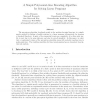Free Online Productivity Tools
i2Speak
i2Symbol
i2OCR
iTex2Img
iWeb2Print
iWeb2Shot
i2Type
iPdf2Split
iPdf2Merge
i2Bopomofo
i2Arabic
i2Style
i2Image
i2PDF
iLatex2Rtf
Sci2ools
STOC
2004
ACM
2004
ACM
A simple polynomial-time rescaling algorithm for solving linear programs
The perceptron algorithm, developed mainly in the machine learning literature, is a simple greedy method for finding a feasible solution to a linear program (alternatively, for learning a threshold function). In spite of its exponential worst-case complexity, it is often quite useful, in part due to its noise-tolerance and also its overall simplicity. In this paper, we show that a randomized version of the perceptron algorithm along with periodic rescaling runs in polynomial-time. The resulting algorithm for linear programming has an elementary description and analysis.
Algorithms | Exponential Worst-case Complexity | Perceptron Algorithm | Simple Greedy Method | STOC 2004 |
Related Content
| Added | 03 Dec 2009 |
| Updated | 03 Dec 2009 |
| Type | Conference |
| Year | 2004 |
| Where | STOC |
| Authors | John Dunagan, Santosh Vempala |
Comments (0)

